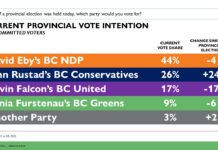– NDP holds early lead (42% of decided voters), ahead of the BC Liberals (29%), BC Greens (16%) and BC Conservative party (12%)
– 58% of British Columbia residents oppose Horgan’s decision to call a snap election
– Half (53%) of decided voters intend to cast ballot in person
IN the early days following the snap election call by Premier John Horgan, Insights West’s election poll shows Horgan with a commanding lead in the early part of the election race even though a significant number of British Columbian’s are opposed to the idea of the election being called a year early.
Horgan’s gamble to call an early election is met with opposition among many voters, even among his own constituents. A total of 58% of BC residents are opposed to the decision to call an early election, including 30% who are “strongly opposed”, and a further 27% who are “somewhat opposed”. The remaining 42% are comprised of mostly those who “somewhat support” (32%) the idea compared to a small number (10%) who “strongly support” the idea.
More importantly, a significant minority (35%) of those voters who intend to vote BC NDP in this current election are opposed to the idea of an early election, but that includes only 7% who are strongly opposed. As expected, the vast majority of BC Liberal voters (77%) and BC Green voters (73%) are opposed to the election being called early.
Although intentions to vote BC NDP have declined slightly since June 2020 (link) (when 47% intended to vote BC NDP), the party still remains firmly in the lead. If an election were held tomorrow, 42% of decided voters would vote BC NDP, compared to 29% who intend to vote BC Liberal. A further 16% would vote BC Green, and 12% intend to vote for the BC Conservatives. Currently the undecided vote stands at 20% of intended voters, and when asked which way they are leaning, voting intentions are led slightly by the BC NDP (20%), followed by the BC Liberals at 17%, the BC Greens at 9% and the BC Conservative Party at 6%; the remaining 46% are truly not sure at this point.
As Insights West found in their last voter intention poll in June, there is a measurable advantage that the BC NDP has in that they are leading in every demographic category from males (38%), females (46%), and voters of different ages (48% of 18-34 years, 42% of 35-54 years , and 38% of 55+ years) and every region in the province as well.
Voter certainty is a significant factor in actual election outcomes, and at this point both the BC NDP and BC Liberal parties enjoy equal levels of certainty in the number of voters in each camp who are very certain they will vote for the party they’ve chosen – 61% of those who intend to vote BC NDP are “very certain” and 65% for the BC Liberals are “very certain”, while the sample size is too low for decided voters for BC Green and BC Conservatives to draw conclusions. A further 31% BC NDP voters are “somewhat certain”, and 29% of BC Liberal Voters are “somewhat certain”, and both parties have only a handful who say they might change their mind come election day.

In terms of potential election platforms that voters will listen to the leaders closely on in the weeks to come, there is no surprise that COVID-19 remains firmly entrenched as the number one issue on voter’s minds as 38% say it’s the number one issue facing our province today (up 3 percentage points since June). The economy and jobs together are also a key issue (15%), as are housing prices (14%). Several other issues could also surface as a potential election issues, including the environment (7%), healthcare (5%), homelessness (4%), and the opioid crisis (4%).
BC Liberal voters place a much higher priority on economy and jobs (29%) compared with BC NDP (8%) or BC Green (7%) voters.
Even with the early lead in the election campaign, election night itself could have an interesting twist because at this early stage because our poll indicates that BC Liberal voters are more likely to cast a ballot in-person (58%), while BC NDP voters are more likely to send mail-in ballots (54% mail-in versus 46% in-person), suggesting that if the election is close, we might not know the results until days after election night. Currently half of total voters in British Columbians (52%) indicate that they are planning to vote in person and just under half intend to vote by mail (48%).
It is not clear that voter sentiment indicates a change in government in BC is needed, as only 48% of decided voters feel that we need a change in government, and a similar number that disagrees (43%). A large number of decided voters (82%) feel that Horgan is calling an election because he feels he can win a majority yet at the same time many agree that calling an election early will enable the BC NDP to have a stronger mandate to help govern during the pandemic (41%). Most (61%) of BC residents believe an election can be held without compromising the safety of voters, but that leaves a large minority who disagree (31%).
“In the early stages of this race, it appears that despite public opposition to the snap election, voter intentions have not shifted dramatically” says Steve Mossop, President of Insights West. “Approval ratings for Horgan are among the highest of any sitting premier, and our previous government report card (June) indicated that his government has received top marks for its handling of COVID-19 as well as many other government files. The question is whether Horgan will be forgiven for calling an early election, and whether COVID-19 infection levels are able to be contained during the election period. However, many elections have been lost or won during an election campaign despite early public polling numbers, and we still have a long way to go before the final ballots are tallied.”
Results are based on an online study conducted from September 22 – 23, 2020 among a sample of 1000 BC residents. The margin of error—which measures sample variability—is +/- 3.1 percentage points, 19 times out of 20. Discrepancies between totals are due to rounding. Click HERE to view the detailed data tabulations.













